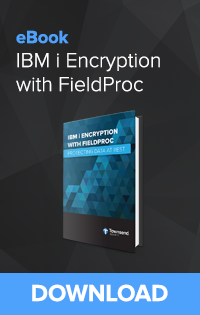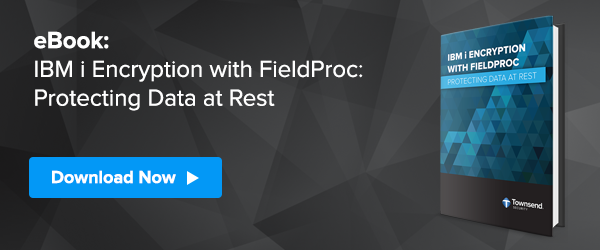Excerpt from the eBook "IBM i Encryption with FieldProc - Protecting Data at Rest."
The performance of an encryption solution is one of the biggest concerns that an IBM i customer has when implementing FieldProc. There are many factors that can affect performance of a FieldProc application and it is wise to pay special attention to performance as you prepare to implement a solution. Let’s look at several factors that can affect performance.
AES 128-bit and AES 256-bit Performance
 All key sizes for AES encryption (128-bit, 192-bit, and 256-bit) are considered secure for protecting all commercial sensitive data. Customers naturally wonder if the smaller key size of 128-bit encryption means better encryption performance when compared to 256-bit AES keys. In fact, the performance difference is much smaller than one might imagine. The smaller 128-bit key size uses 10 rounds during AES encryption, but the 256-bit AES keys use 14 rounds during AES encryption. The IBM i RISC processor optimizes cryptographic operations so the performance penalty for 256-bit AES encryption is very small. Considering that cybersecurity guidelines now recommend the use of 256-bit AES for protecting data in long-term storage, and for protecting against advances in quantum computing, you should always consider using 256-bit AES encryption for protecting IBM i sensitive data.
All key sizes for AES encryption (128-bit, 192-bit, and 256-bit) are considered secure for protecting all commercial sensitive data. Customers naturally wonder if the smaller key size of 128-bit encryption means better encryption performance when compared to 256-bit AES keys. In fact, the performance difference is much smaller than one might imagine. The smaller 128-bit key size uses 10 rounds during AES encryption, but the 256-bit AES keys use 14 rounds during AES encryption. The IBM i RISC processor optimizes cryptographic operations so the performance penalty for 256-bit AES encryption is very small. Considering that cybersecurity guidelines now recommend the use of 256-bit AES for protecting data in long-term storage, and for protecting against advances in quantum computing, you should always consider using 256-bit AES encryption for protecting IBM i sensitive data.
AES Encryption Software Performance
Encryption software libraries can vary greatly in performance even when using exactly the same methods and key sizes. Unfortunately the native IBM i AES encryption software library and APIs have a low performance profile and this can have a negative impact on your IBM i applications. Fortunately, there are high performance AES encryption libraries available from third parties that have a much better performance profile. The difference between the native IBM encryption libraries and third party libraries can be more than 100 times in processing speed. Use care when deploying an encryption solution to insure that the performance meets your minimum needs for processing time.
POWER8 On-Chip AES Encryption Performance
The new Power8 processor from IBM provides a hardware implementation of AES encryption to improve the performance of encryption. All new models of IBM i servers built with the POWER8 processor include this hardware implementation of AES encryption. In concept this is similar to the Intel processors which provide AES encryption through the AES-NI implementation.
While encryption performance has improved with the POWER8 processor, it is not a large improvement. Encryption speeds using the native IBM i APIs are about double the speed of the previous versions of the Power processor, but still greatly lag in performance compared to third party encryption libraries. It should be noted that this performance lag disappears when the IBM APIs are used to encryption very large blocks of information. For example, the AES implementation on the POWER8 processor can encrypt a megabyte of information at incredible speeds. Unfortunately this does not apply to the smaller blocks of data (credit card numbers, social security numbers, etc.) that are typically stored in DB2 database tables. It is likely that IBM i customers using iASP encryption will see a major performance bene t with the new POWER8 systems.
FieldProgram Program Performance
When FieldProc invokes a program to perform encryption or decryption it makes a dynamic all to a program executable. There is always a certain amount of overhead when making a dynamic call to an external program and this is true in FieldProc context, too. The more columns in a table that are under FieldProc control the more dynamic calls you will have to the FieldProc program as the FieldProc program is invoked independently for each column. It is important that the FieldProc program be properly optimized
for performance. Some key performance measures include:
- Minimized file I/O operations by the FieldProc program.
- Program modules are optimized on compilation.
- The program executable is optimized on compilation.
- Memory management is optimized for performance.
- Visibility of program objects is removed to improve performance.
- The FieldProc program is optimized for multi- threaded operation.
- Audit logging is optimized for performance.
It is important that the FieldProc application be properly optimized as it may be invoked many times during a typical interactive or batch request.
FieldProc for Multiple Columns in a Table
It is likely that you will need to protect multiple columns in a table. For example, in a medical setting a table might contain the following information for a patient:
- Name
- Date of birth
- Address
- Social security number
- Email address
- Etc.
Key Management Performance Impacts
As mentioned above your FieldProc encryption solution should implement good encryption key management practices. It is important that the key management interface impose little performance penalty. This means that the FieldProc application should use intelligent and secure key caching to minimize the number of key retrieval operations that must be performed. Additionally keys should not be exposed in user applications, but should be protected in separate modules. When implemented properly good key management will impose extremely little performance impact.
Audit Logging Performance
One common feature of FieldProc applications is the ability to collect audit information about user activity. This might include collecting information about which users accessed decrypted information, etc. Audit logging will always extract a performance price. If you need to collect audit logs of FieldProc activity be sure to measure the performance impact of audit log collection in your own environment.

